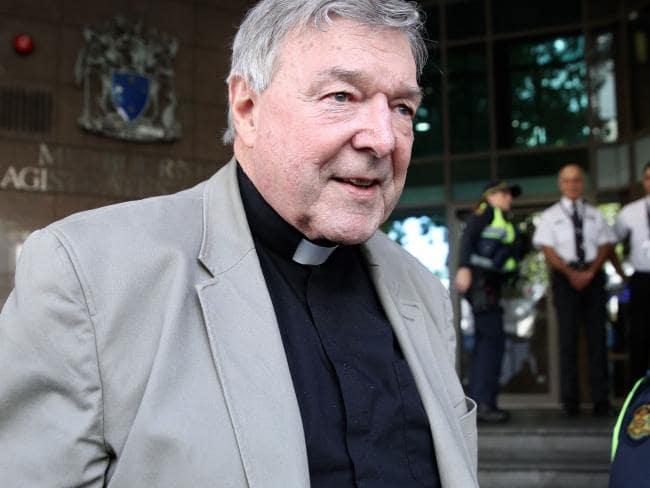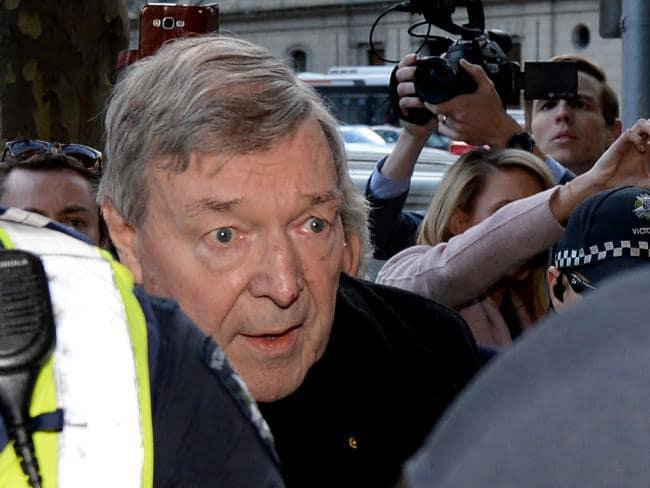|
Cardinal George Pell to stand trial over historical sex offences
news.com.au
April 30, 2018
http://www.news.com.au/national/victoria/decision-day-will-cardinal-george-pell-face-trial-on-historical-sex-offence-charges/news-story/8d7d1c1e8cfc2dcfc5a2aafcf7dce3ea
 |
Cardinal George Pell will stand trial.
Photo by Con Chronis |
 |
Cardinal Pell was met by a large media scrum outside court during each of his appearances.
Photo by Mal Fairclough |
[with video]
AUSTRALIA’S most senior Catholic, Cardinal George Pell, will stand trial on a number of historical sexual offences, but the most serious have been dismissed.
CARDINAL George Pell will stand trial on a number of historical sexual offence charges, but the most serious have been dismissed.
Melbourne magistrate Belinda Wallington on Tuesday ordered Pell, 76, to stand trial on some charges and but struck out half of those she was asked to consider.
Australia’s most senior Catholic cleric has strenuously denied all charges and was in court on Tuesday to plead not guilty.
Among the charges thrown out of court was an allegation Pell abused a complainant during a screening of the film Close Encounters of a Third Kind at a country Victorian cinema.
Charges alleging Pell had continued to abuse the same complainant over a 12-month period at a church and another location were also struck out.
“The most serious offending alleged could not have occurred in the time frame alleged,” Ms Wallington said. “I find that the evidence of a whole is not of sufficient weight for a jury to convict.”
Ms Wallington also struck out another charge centred on an incident at a swimming pool after she found the complainant was an “unsatisfactory witness”.
“His lack of recall was often a non-responsive way of avoiding answering questions,” she told the court. “It is difficult to see how a jury can convict on the evidence of a man who said he can’t recall what he said a minute ago.”
Ms Wallington said the complainant represented one of the rare instances when a witness’ “cavalier attitude” to giving evidence meant “no jury can put weight upon it”.
Earlier Tuesday Pell arrived by car in front of the downtown court where more than 40 uniformed police officers were waiting to maintain order as media jostled on the crowded sidewalk to videotape and photograph him.
Pell climbed the stairs to court accompanied by his lawyer Robert Richter about 45 minutes before the hearing was to begin. Some protesters shouted as he arrived.
Tuesday’s decision follows a four-week long pre-trial committal hearing in March during which more than 30 people were cross-examined by the defence. The charges committed for trial will be dealt with by Victoria’s County Court.
Lawyers for Australia’s highest-ranking Catholic argued the preliminary hearing in March that the accusations were untrue and should be dismissed. Pell has said through his lawyers that he will plead not guilty if the magistrate decides against dismissing the charges.
Pell, Pope Francis’ former finance minister, was charged last June with sexually abusing multiple people in his Australian home state of Victoria. The details of the allegations against the 76-year-old have yet to be released to the public, though police have described the charges as “historical” sexual assault offences — meaning the crimes allegedly occurred decades ago.
His alleged victims testified in the first two weeks of the preliminary hearing via a video link from a remote location to a room closed to the media and public.
Mr Richter told Mrs Wallington in his final submissions two weeks ago that the complainants might have testified against one of the church’s most powerful men to punish him for failing to act against abuse by clerics.
But prosecutor Mark Gibson told the magistrate there was no evidence to back Mr Richter’s theory that Pell had been targeted over the church’s failings. Since Pell returned to Australia from the Vatican in July, he has lived in Sydney and flown to Melbourne for his court hearings. His circumstances are far removed from the years he spent as the high-profile and polarising archbishop of Melbourne and later Sydney before his promotion to Rome in 2014. Pell’s face has shown little emotion while attending court during his hard-fought and extraordinarily long preliminary hearing.
He was frisked for weapons in standard security procedures as he entered the high-rise court building, and shared its corridors with alleged drug dealers, thieves, thugs and drunken drivers during breaks in court proceedings. The case places both the cardinal and the pope in potentially perilous territory.
CHARGES FELT IN THE VATICAN
For Pell, the charges are a threat to his freedom, his reputation and his career. For Francis, they are a threat to his credibility, given he famously promised a “zero tolerance” policy for sex abuse in the church. Advocates for abuse victims have long railed against Francis’ decision to appoint Pell to the high-ranking position in the first place. At the time of his promotion, Pell was already facing allegations that he had mishandled cases of clergy abuse during his time leading the church in Melbourne and Sydney, Australia’s largest cities.
So far, Francis has withheld judgment of Pell, saying he wants to wait for justice to run its course. And he did not force the cardinal to resign, though Pell took an immediate leave of absence so he could return to Australia to fight the charges. Pell said he intends to continue his work as a prefect of the church’s economy ministry once the case is resolved.
In recent years, Pell’s actions as archbishop came under particular scrutiny by a government-authorised investigation into how the Catholic Church and other institutions have responded to the sexual abuse of children. Australia’s Royal Commission Into Institutional Responses to Child Sexual Abuse — the nation’s highest form of inquiry — revealed last year that 7 per cent of Catholic priests were accused of sexually abusing children in Australia over the past several decades.
In testimony to the commission in 2016, Pell conceded that he had made mistakes by often believing priests over people who said they had been abused. And he vowed to help end a rash of suicides that has plagued abuse victims in his hometown of Ballarat.
Pell testified to the inquiry in a video link from the Vatican about his time as a priest and bishop in Australia. He did not attend in person because of a heart condition and other medical problems.
Police said at the preliminary hearing that they had planned to arrest Pell for questioning had he returned to Australia in early 2016 to testify. His lawyers argued in court that Pell was targeted for “special treatment” by detectives from a police task force that investigated historical sex abuse. Police witnesses denied that accusation.
The investigation of Pell began in 2013 before any complainant had come forward to police, whom Richter accused of running “a get Pell operation.” Pell’s lawyers told the court in February that the first complainant approached police in 2015, 40 years after the alleged crimes, in response to media reports about the royal commission.
Pell was charged by summons in Rome and agreed to return to Australia to face the allegations.
|

